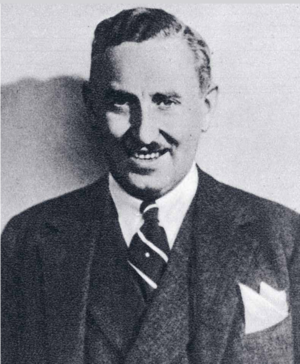René Boël
( businessman, Belgian nobility) | ||||||||||||
|---|---|---|---|---|---|---|---|---|---|---|---|---|
 | ||||||||||||
| Born | 27 October, 1899 | |||||||||||
| Died | 29 June,1990 (Age 90) | |||||||||||
| Nationality | Belgian | |||||||||||
| Alma mater | Université libre de Bruxelles | |||||||||||
| Parents | • Pol-Clovis Boël • Marthe de Kerchove de Denterghem | |||||||||||
| Children | • Pol-Gustave Boël • Antoinette Boël • Yves Boël • Michel Boël • Jacqueline Boël | |||||||||||
| Spouse | • Yvonne Solvay • Mathilde de Jonghe d'Ardoye | |||||||||||
| Relatives | • Gustave Boël • Eugène de Jonghe • Nicolas Boë • Harold Boël • Jacques Boël | |||||||||||
Married into the Big Chemical Solvay family, where he became director. Represented Belgium at the Bretton Woods Conference. After the war, he was involved with the European League of Economic Cooperation. Attended Bilderberg/1960.
| ||||||||||||
René Gustave Pol Marie Ghislain Count Boël was a Belgian industrialist who married into the Big Chemical of the Solvay family. Advised the Belgian government-in-exile in London, and represented Belgium at the Bretton Woods Conference. After the war, he was president of the European League of Economic Cooperation, a political advocacy group which advocates for closer European integration and which was one of the founding members of the European Movement. He corresponded with Allen Dulles on the matter.[1] He attended the 1960 Bilderberg meeting.
Background
René Boël, scion of the Boël family, was a son of Baron Pol-Clovis Boël, an industrialist and liberal member of parliament and senator, and jonkvrouw Marthe de Kerchove de Denterghem, feminist and activist. He was a grandson of industrialist and liberal senator Gustave Boël. He went to school at the Royal Atheneum in Uccle. In 1916 he became a war volunteer at the age of 17. Subsequently, Boël studied civil engineering at the Université libre de Bruxelles.
In 1922 he married Yvonne Solvay (1896-1930), granddaughter of industrialist and liberal senator Ernest Solvay of the large Solvay Big Chemical corporation, with whom he had three children: industrialist and liberal senator Pol-Gustave Boël (1923-2007), Antoinette Boël (1925-1982) and entrepreneur Yves Boël (1927-2012). In 1935 he remarried, to Viscountess Mathilde de Jonghe d'Ardoye (1909-2008), daughter of politician Eugène de Jonghe, with whom he had two children: Michel Boël (1936) and Jacqueline Boël (1939). René Boël was the grandfather of Nicolas Boël and Harold Boël and the uncle of Jacques Boël.
Boël bought Fontaine Castle in Onhaye from his father-in-law. He sold the castle in 1983.[2]
Career
In 1922 he started working for Usines Gustave Boël, of which his father was managing director. His responsibility was to rebuild the factories that had been destroyed by the German occupiers during the First World War.
In 1926 Boël became a lecturer and later full professor of iron metallurgy at the École polytechnique of the Université libre de Bruxelles.
After marrying Yvonne Solvay, he became involved with Union Chimique Belge and Solvay, his in-laws' businesses. In 1931, he became a member of Solvay's executive committee. He handed over his responsibilities for the Boël factories to his younger brother Lucien. In 1963 Boël became chairman of the executive committee.
Between the two wars, Boël maintained contacts in the liberal political environment. In 1936 he co-founded the Study Center for State Reform, of which he was chairman of the social committee.
During World War II he advised the Belgian government-in-exile in London. He headed the economic mission and was responsible for supplying the Belgian army and protecting Belgian assets abroad, including in the United States. Boël also expanded Solvay in Brazil during the war. In 1941, Secretary of the Treasury Camille Gutt appointed him as government adviser on finance, where he represented Belgium at the Bretton Woods Conference, which among other things led to the establishment of the International Monetary Fund and the World Bank. In particular, he got to know Jean Monnet, with whom he developed a genuine friendship that was to emerge strengthened at the end of the war.[3]
After the war he was closely involved in the European unification process. In 1949 he became Vice-President of the European League of Economic Cooperation. In 1951 he became its chairman, a position he held until 1981. Boël was also committed to American-European cooperation and in 1945 was one of the first members of the Belgian-American Association, of which he became president in 1963.
He co-founded the Museum of Modern Art. He was also president of the Friends of the Royal Museums of Fine Arts of Belgium. In 1973 he was the initiator of the creation of the Federation of the Friends of the Museums of Belgium.
Boël was also:
- Co-founder and director of the Industry University Foundation (1956-1970)
- Member of the board of directors of the Université libre de Bruxelles (1959-1969)
- Chairman of the board of directors of the National Orchestra of Belgium (1959-1967)
- Member of the executive committee of the Association of Belgian Industry (1960-1971)
- Chairman of the board of directors of the Société philharmonique de Belgique
- Vice president of the United Fund for Belgium (1972-1979)
Event Participated in
| Event | Start | End | Location(s) | Description |
|---|---|---|---|---|
| Bilderberg/1960 | 28 May 1960 | 29 May 1960 | Switzerland Bürgenstock | The 9th such meeting and the first one in Switzerland. 61 participants + 4 "in attendance". The meeting report contains a press statement, 4 sentences long. |